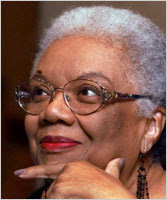On Saturday, February 13, 2010 prolific, and widely-acclaimed poet Lucille Clifton died. Clifton was a poets poet a great teacher of poetry and highly decorated for her work. Lucille Clifton was the first author to have two books of poetry chosen as finalists for the Pulitzer Prize, Good Woman: Poems and a Memoir, 1969-1980 (1987) and Next: New Poems (1987). A bio of the award winning writer can be found here.
Share
GOOD TIMES
my daddy has paid the rent
and the insurance man is gone
and the lights is back on
and my uncle brud has hit
for one dollar straight
and they is good times
good times
good times
my mama has made bread
and grampaw has come
and everybody is drunk
and dancing in the kitchen
and singing in the kitchen
of these is good times
good times
good times
oh children think about the
good times
Lucille Clifton
Readings: books by and about Lucille Clifton-
Generations : a memoir
Good woman : poems and a memoir, 1969-1980
Mercy : poems
Voices : poems

